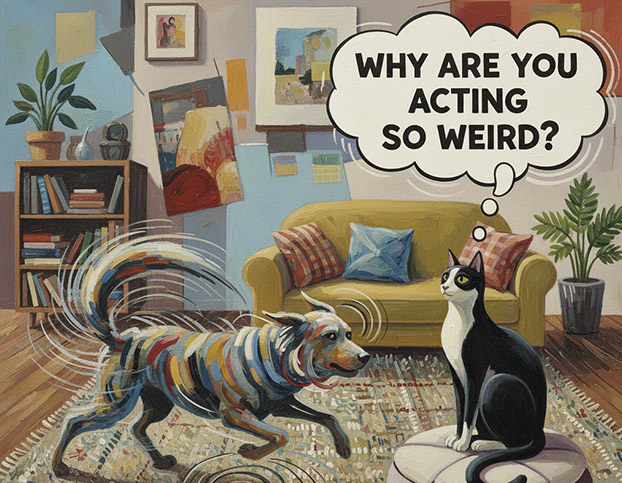Every dog owner in Savannah has watched their pup spin in circles for five minutes before finally lying down, and every cat owner across the Lowcountry has been treated to a session of “making biscuits” on their chest. We often dismiss these perplexing actions as simple personality quirks, but what if they were something more?
This fun guide, brought to you by the specialists at Savannah Veterinary Internal Medicine, dives deep into the strange, sometimes baffling behaviors of dogs and cats. The truth is, your modern, pampered pet is still heavily influenced by ancient instincts—behaviors that were crucial for their survival in the wild, but now just make for good stories in your living room. The fascinating evolutionary science behind why your beloved companion acts so weird is revealed below.
Decoding Canine Quirks
We love our dogs for their loyalty and goofy personalities, but many of their most common quirks are actually instinctual from their wolf ancestors—behaviors that were once matters of survival but are now simply innate rituals.
🌀 The Great Circle Dance: Why Your Dog Spins Before Bed
This is perhaps the most famous canine mystery. Before settling onto a perfectly soft dog bed or rug, your dog will often circle vigorously.
The Ancestral Nest: Wild canids had to create their own beds. Circling helped flatten tall grass, leaves, or snow to create a softer, more insulated nest.
The Safety Check: The rotation allowed them one last 360-degree security check for predators or threats before lowering their defenses.
The Comfort Factor: Despite the plush orthopedic mattress you bought them at the local store in Pooler, your dog is still prepping for a night in the wild, even if that’s just a rug in your Historic District home.
🤮 The Signature Scent: Why Rolling in Poop is a Priority
You are likely to gasp in disgust when you see your otherwise immaculate dog vigorously rolling in the most repulsive thing they can find (often feces or a dead animal). While it seems like a deliberate attempt to offend, it is an extremely old evolutionary behavior.
The Hunter’s Disguise: Wild canids would roll in strong-smelling droppings of another animal to drown out their own scent. By masking their own odor, potentially smelling like a less threatening animal, they could approach cautious prey more easily.
The Modern Mishap: Though your dog is now a well-fed companion with no need to sneak up on prey, the instinct to use a “strong cologne” persists, leading to a frantic bath the moment they get home from a walk through the marshlands of Skidaway Island or a visit to a park in Bluffton.
💨 The Post-Poop Kick-Back: It’s Not Tidy-Up Time
After doing their business, many dogs vigorously kick dirt, grass, or imaginary air backward, sending debris flying, often dirtying your shoes and pants! Most owners assume they’re trying to cover the mess—but the opposite is true.
The Real Purpose: Marking Territory. This is a powerful scent-marking behavior. Dogs have specialized interdigital glands (scent glands between their toe pads).
A Pheromone Bomb: By scraping their feet, they are releasing a cocktail of pheromones that serves as an olfactory and visual announcement to any other dog that passes through: “I was here.”
Unmasking Feline Mysteries
While dogs often display their instincts loudly, cats are masters of subtle, ritualistic behavior. Their ancestors were solitary hunters, so their ‘quirks’ are often focused on personal comfort, marking, and maintaining a low profile.
🍞 Making Biscuits: The Kittens-Only Reflex That Never Left
When your cat rhythmically pushes its paws in and out on a blanket or your lap, it’s engaged in the endearing act of kneading (“making biscuits”).
The Nursing Instinct: The behavior originates in kittens, who knead their mother’s mammary glands to stimulate milk flow.
The Nest Builder: It also serves an ancestral purpose: wild cats kneaded grass and foliage to create a soft, firm nest for resting. When your cat kneads your blanket in Beaufort, it is showing you a sign of comfort and security.
💨 The Speedy Burial: Why Your Cat Hides Evidence
As soon as a cat uses the litter box, it meticulously scrapes and covers its waste. This is tied directly to its wild nature as a mid-level predator.
Hiding the Trail: For the African Wildcat, covering waste prevented the scent from alerting larger, more dominant predators (like lions or leopards) to their presence.
Modern Habit: Since your Savannah home poses no threat from apex predators, this behavior has evolved into an ingrained, necessary ritual for security and cleanliness within the household.
👊 The “Gravity Check”: Why Your Cat Knocks Things Off Shelves
If you’ve ever watched a glass tumble from the edge of a table after your cat gives it a deliberate swipe, you’ve witnessed feline investigative instinct at work. They aren’t trying to be malicious; they are trying to learn and confirm.
The Sensorimotor Test: A cat’s paw pads and whiskers are incredibly sensitive. When they nudge an object, they are testing several crucial things about their environment, much like a cat in the wild would poke something new with its paw to test for safety or whether it might be prey.
Is It Safe? Cats are cautious predators. They are testing the object’s stability, weight, and texture. If it’s loose or wobbly, knocking it over removes a perceived uncertainty in their territory, and helps them to better understand their environment.
Conclusion: Appreciating the Wild Within
Your beloved companions are more complex than their cozy lives suggest. That circling dog honors an ancient ritual, while that cat making biscuits on your lap is a primal nesting instinct.
Understanding these evolutionary echoes deepens our appreciation for our animal companions. They remain true, instinctive descendants of the wild, despite their soft fur and specialized food bowls.
Recognizing the purpose behind their quirks strengthens your bond and ensures their happiness. There are no aliens here—just well-adapted animals whose strange quirks are a nod to their wild past.
Understanding these evolutionary echoes deepens our appreciation for our animal companions.
If your pet’s behavior suddenly or intensely changes, it may have an underlying medical reason. Savannah Veterinary Internal Medicine offers advanced diagnostic testing for various internal medicine disorders and diseases. There’s no referral needed. Contact us today at (912) 721-6410 or submit an online consultation request. We look forward to assisting your pet.

Author:
James Woods DVM, MS, DACVIM (SAIM)
Ph: (912) 721-6410
Contact Us
